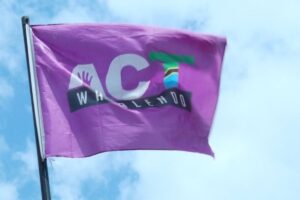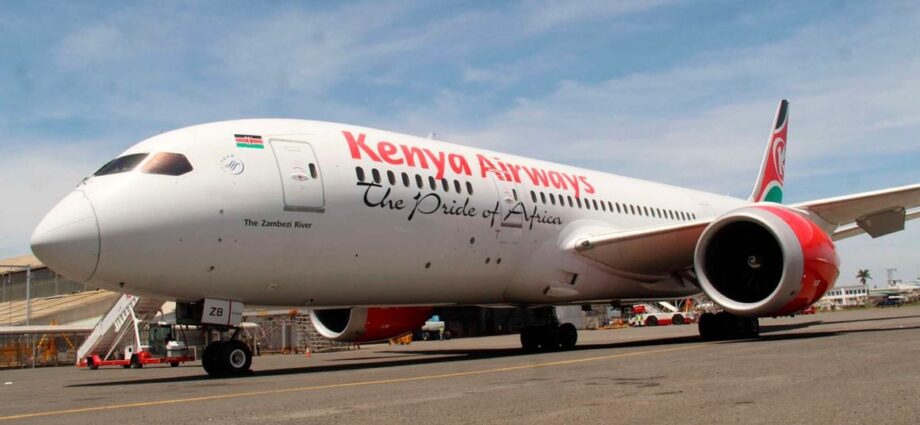Economy
President Ruto meets Delta Air, to sell all State stake in Kenya Airways (KQ)
Monday December 19 2022
Ruto meets Delta Air, wants to sell all State stake in KQ. PHOTO | LUCY WANJIRU | NMG
President William Ruto met top executives of Delta Air Lines in his American trip where he launched the government bid to sell its entire 48.9 per cent stake in Kenya Airways.
The President held a meeting with executives from Delta Air Lines Inc., the largest US carrier by market value, last Thursday.
He, however, declined to provide details of the talks as Kenya seeks a cash-flush foreign airline as a strategic investor in the national carrier to offer expertise and cut its reliance on Treasury handouts for operational cash.
“I’m willing to sell the whole of Kenya Airways Plc,” Dr Ruto told Bloomberg News on the sidelines of the US-Africa Leaders Summit in Washington DC on Friday. “I’m not in the business of running an airline that just has a Kenyan flag, that’s not my business.”
US President Joe Biden last week hosted the US-Africa summit and will discuss the 2023 elections and democracy in the continent with about 50 African Heads of State.
Over 300 American and African companies met with heads of different delegations to talk about investments in critical sectors, the White House said Tuesday.
ALSO READ: Ruto seeks KQ sale to strategic investor in US trip
“Discussions with Delta are at a preliminary stage,” Dr Ruto said in the US.
“The government is looking for partnerships that will make Kenya Airways a profitable entity whatever that means, in whatever configuration, whatever form it takes,” he added.
Delta has previously shown interest for a piece of Kenya air traffic.
In 2009, the airline halted plans to launch four direct flights a week between Nairobi and Atlanta via Dakar after the US Transportation Security Administration (TSA) failed to clear the new route, citing “noted security vulnerabilities in and around Nairobi.”
This saw Kenya summon the then US ambassador to explain the last-minute cancellation of new Delta Air Lines flights on security fears.
The government in 1995 sold a 26 percent stake in KQ to Dutch airline KLM and sold a further 22 percent stake to local shareholders through an initial public offering at the Nairobi bourse in 1996.
The deal offered KLM seats on the KQ board, the right to appoint certain executives, in particular the CFO, and act as the technical partner for the national carrier.
KLM has reduced its stake from 26.7 per cent after the conversion of State debt and bank loans to equity diluted the firm’s ownership to 7.76 per cent.
The multinational had expressed its desire to exit KQ when the government opted to nationalise the airline.
In 2021, Kenya Airways agreed with Air France-KLM to end a code share for Africa-Europe routes.
The national carrier has received multi-billion shilling State bailouts amid delayed recovery from a travel slump following Covid-19.
The fresh restructuring plan comes after the State dropped the favoured long-term solution that was anchored on nationalisation of the airline.
READ: Kenya Airways escalates fight with pilots, seeks to dissolve CBA
The plan approved by MPs in July 2019 would have led to the delisting of the airline from the Nairobi Securities Exchange (NSE).
A law to pave the way for the nationalisation of the airline, which had been proposed before the pandemic, is before Parliament.
Kenya wanted to emulate countries such as Ethiopia, which run air transport assets — from airports to fuelling operations —under a single company, using funds from the more profitable parts to support others.
Under the model approved by MPs, Kenya Airways would become one of four subsidiaries in an aviation holding company.
The others would be Jomo Kenyatta International Airport, an aviation college and the Kenya Airports Authority operating all other airports.
The airline, which has been surviving on State bailouts since the Covid-19 pandemic, reported an Sh9.8 billion loss in August — a better performance than the Sh11.48 billion loss it recorded in the same period a year earlier.
Share this news
This Year’s Most Read News Stories

Tanzania: Samia Hands Over NBC’s 354m/ – Crop Insurance Compensation to Farmers Affected By Hailstorms
President Samia Suluhu Hassan, has handed over a cheque of 354m/- from the National Bank of Commerce (NBC) as compensation to tobacco farmers, who were affected by hailstorms during the previous farming season in various regions across the country.
Handing over the cheque in Dodoma, the compensation is part of the crop insurance service provided by NBC in collaboration with the National Insurance Corporation (NIC).
Furthermore, President Samia has also handed over health insurance coverage to members of the Lindi Mwambao Cooperative Union based in Lindi Region, through the Farmers’ Health Insurance service provided by the bank in partnership with Assurance Insurance Company.
While visiting the bank’s pavilion at the Nanenane Agricultural Exhibition and being received and briefed by the bank’s Managing Director, Mr. Theobald Sabi, she said: “This crop insurance is one of the crucial solutions in ensuring farmers have a reliable income, without fear of challenges such as natural disasters, including hailstorms.
“I call upon all farmers in the country to make the best use of this important opportunity by accessing these kinds of insurance services. I also highly commend NBC and all the stakeholders participating in this programme.”
Elaborating further on the crop insurance service, the Minister of Agriculture, Hussein Bashe, stated that it will help to recover the loss farmers incurred, especially in various calamities beyond their control.
Citing them as floods, fires, and hailstorms, which have significantly affected the well-being of farmers and caused some to be reluctant to invest in the crucial sector, Mr Bashe added: “However, our President, this step by NBC is just the beginning, as this is the second year since they started offering this service, and the results are already visible.

Sign up for free AllAfrica Newsletters
Get the latest in African news delivered straight to your inbox
“As the government, we promise to continue supporting the wider implementation of this service, with the goal of ensuring that this crop insurance service reaches more farmers.”
ALSO READ: NBC participates in TFF 2023/24 awards, promises to enhance competition
On his part, Mr Sabi said that the farmers who benefited from the compensations are from 23 primary cooperative unions in the regions of Shinyanga, Geita, Tabora, Mbeya, Katavi, and Kigoma.
He added: “In addition to these insurance services, as a bank, through this exhibition, we have continued with our programme of providing financial education and various banking opportunities to farmers, alongside offering them various loans, including loans for agricultural equipment, particularly tractors, to eligible farmers.:
At the NBC booth, President Samia also had the opportunity to be briefed on the various services offered by the bank to the farmers namely crop insurance and health insurance services.
There, the President had the chance to speak with some of the beneficiaries of the services, including the Vice-Chairman of the Lindi Mwambao Primary Cooperative Union, Mr. Hassan Mnumbe, whose union has been provided with a health insurance card from the bank.
Source: allafrica.com

ACT Unaware of Mwinyi’s joint committee on Zanzibar reforms
Opposition party ACT Wazalendo has said it is not aware of a special committee on reforms and has directed the party’s leadership to follow up on the decision of the Central Committee which directed its leaders to meet with President Hussein Ali Mwinyi.Continue Reading

Tanzania central bank tells hotels to obtain foreign currency exchange license
BoT governor, Emmanuel Tutuba, urges tourist hotel owners and operators to obtain foreign currency exchange licences to combat the black market.Continue Reading











